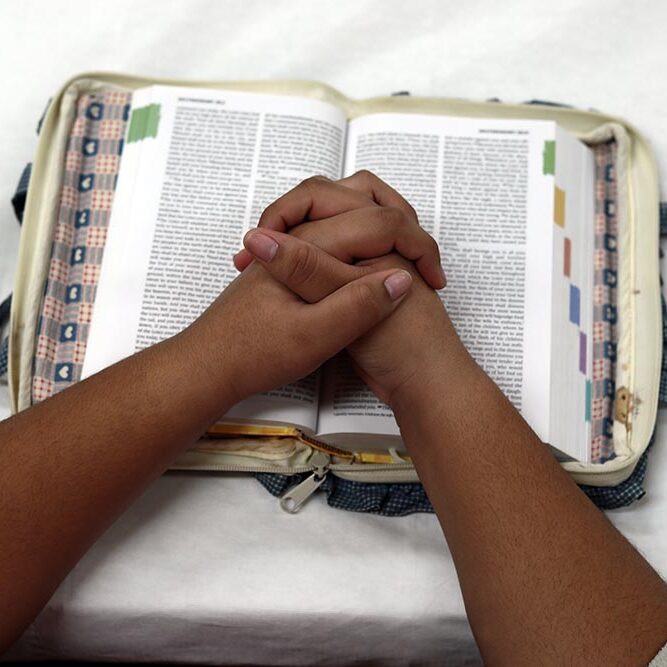What We Believe
We believe:
- that the Bible is the Word of God. Consequently, all of its content is absolutely true and in its original manuscript is without error. We believe that we read and study the Bible in order to understand its meaning, allowing Scripture to interpret itself through other related Scripture passages. References: 2 Timothy 3:16-17; 2 Peter 1:21; John 10:35
- in a Triune God who is described in the Bible as the one, true God who has revealed Himself as God the Father (the creator of all), Son (our savior and redeemer), and Holy Spirit (our sanctifier). References: Deuteronomy 6:4; Matthew 28:19; John 5:23; 1 John 2:23; Genesis 1:1; 1 John 2:1,2; Romans 15:13
- that humanity was created by God to be holy and to have eternal life. However, man chose to break his communion with God and fall into sin, bringing death as a punishment to this world. We teach that man cannot, by his own efforts, free himself from the chains of death and hell. References: Genesis 1:27; 2:7; Chap 3; Psalm 14:3; Romans 5:12; Isaiah 64:6; Psalm 143:2; 1 Corinthians 2:14
- that the Law of God teaches us what God desires from us, which is perfection of heart, thought, word, and deed. Because of humanity's disobedience in the garden of Eden (Genesis 1), the Law has pointed out our separation from God. As a result, we are unable to fulfill His Law. References: Matthew 5:48; Leviticus 19:2; Deuteronomy 27:26; Romans 3:20
- that the Gospel message tells us that, despite our sin, God has loved us and sent His Son Jesus Christ to pay the price of our sin and to set us free from death and Satan. References: Ezekiel 33:11; 1 Timothy 2:4; Luke 4:18,19; John 3:16; Romans 3:21-24; 1:16
- that the Bible tells us that Jesus Christ is the Son of God and equal to God the Father. Jesus was conceived of a virgin named Mary. He became a man in order that He might redeem the world by satisfying the demands of the divine Law for all people by keeping God's Commandments in our place and then bearing the punishment of all the world's sin by suffering, dying, and then rising from the dead. It is written in the Bible that he will come again at the world's end to judge righteous and the damned. References: John 5:20, 23; 10:30; 14:9; Matthew 1:18-25; 1 Peter 2:22; Galatians 4:4, 5; 3:13; 1 Peter 2:24; 1 John 2:1,2; Romans 4:25; John 14:19; Acts 1:11; 10:42
- that faith is a penitent sinner's dependence on Jesus Christ as his real and only Savior, fully depending on Christ's merits for forgiveness of sins and salvation. Faith is not a personal achievement, an act of human merit, or a decision we make rather it is the work of the Holy Spirit. References: John 1:12, 16; Acts 10:43; Galatians 2:16; 1 Corinthians 12:3; 1 Peter 1:5; Acts 16:31; Matthew 24:13; John 3:36
- that we are now justified, cloaked in in the robe of righteousness provided by Jesus' death and resurrection. Faith in Jesus makes us just before the Law of God because Jesus fulfilled the Law perfectly through his life, death, and resurrection. References: 2 Corinthians 5:19; Romans 5:18,19; Acts 10:43; Romans 3:22-24, 28; Ephesians 2:8
- that Baptism is a divinely instituted washing of regeneration, intended for young and old without exception. It may be administered by sprinkling, pouring, or immersion; and that by it all who in faith receive this sacrament are given the grace of God through the Holy Spirit, forgiveness of sins, and the promise of eternal life. References: Matthew 28:19; Titus 3:5; Mark 10:14; Acts 16:15; Hebrews 10:22; Acts 22:16; 2:38; Mark 16:16
- that The Lord's Supper is the body and blood of Jesus Christ, truly present in and with the bread and the wine in the sacrament of Holy Communion. This sacrament is received by the penitent believing Christian for the strengthening of their faith and their growth in godliness. As taught in the Bible, this sacrament is reserved only to those who have professed their Christian faith and received instruction in its significance. References: Matthew 26:26-28; 1 Corinthians 10:16; 11:17-33; Matthew 7:6
- that the body, separated in death from the soul, will be raised on the Last Day and reunited. All people will be judged by God: those who believe in Jesus Christ's death and resurrection, and thus are cloaked in the robe of righteousness that only Jesus' death on the cross could provide, will be given eternal life in heaven, while those who do not believe will be sent into eternal condemnation. References: John 5:28, 29; Matthew 25:31-46
We recognize and adhere to the ancient creeds of the early Christian church. A creed is simply a statement of what one believes. Every professing Christian has a creed, whether by admission or not. A true creed is not an addition to the Bible, but only a necessary statement of the truth against those who misuse the Bible for the support of their false teachings and to resist the additions of errors to the teachings of the church. References: 1 Peter 3:15; Matthew 10:32
